One year later: those leading the fight against COVID-19 tell their story
One year after the outbreak of the health crisis in Spain, we spoke to some of the leaders in the fight against the virus to find out how aid was mobilized. In the case of science, researchers consider this aid “essential for the research of this pandemic.” Three and a half million people have benefited from the global plan that BBVA launched in March 2020, ‘Social Response to COVID-19’. The money has been used to purchase medical equipment, support vulnerable groups and for research on the disease.
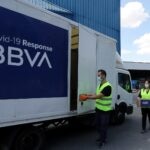
In the front lines of the health emergency
In March 2020 (when the first wave of the pandemic was in full force), BBVA managed to purchase 2,813 ventilators in record time in an unprecedented operation. Since then, the bank has launched various initiatives to help face the health crisis. 81 percent of the resources from BBVA’s ‘Social Response to COVID-19’ plan were used to purchase medical equipment, which have served to directly assist 839,773 people.
Hospital Gregorio Marañón of Madrid was one of the hospitals that received the direct aid from BBVA in the form of ventilators during the most critical moments of the outbreak of the pandemic. “The donated ventilators played an important role, especially for patients with severe, but not critical, cases, who needed some type of respiratory support in the initial phases of the inflammation secondary to the virus,” recalls Daniel López Padilla, a pulmonologist from this hospital. He concluded that: “The experience has shown that in some cases, they prevented the progression of the disease to more severe situations that would have led the patient to be put under intensive care, and eventually put on invasive mechanical ventilation. Therefore, the ventilators were extremely useful and continue to be useful in this context.”
In an unprecedented health emergency, all social actors did their part, as did businesses from the private sector. Doctor Padilla recognizes that: “BBVA was the private company we had the most contact with, and if my memory serves me, the first.” Although he is aware that it is relatively easy to talk about the past and that no one has a manual on how to manage a pandemic of this size, he does stress that “there was a mobilization; aid was coordinated very quickly and above all, there was interest in collaborating with other hospitals, opening dissemination channels to share the experience with other professional colleagues with perhaps, fewer resources.” Regarding the experience with the latter, that intense collaboration among everyone in which each person took on their role with responsibility and professionalism, was what Doctor Padilla considers “the decisive factor that saved lives - not just in the first wave, but in any wave that followed.”
Several weeks later, in Mexico City, the situation started to resemble what took place in Spain, explained Rafael del Río Aguirre, Director General of Unique Experience and Loyalty for BBVA in Mexico. Medical equipment - ventilators especially - started to become scarce. “BBVA Mexico couldn’t stand back because in moments of adversity, it is committed to act in solidarity and promote care for people. That’s why it establishes partnerships with leading institutions: to respond in a timely, immediate and quality manner to those in need,” said Río. The bank donated 22.2 million pesos to the Mexican Red Cross, and 21.9 million to Doctors Without Borders.
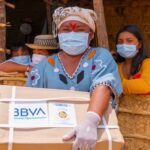
Reception of one of the markets delivered by BBVA in Colombia within the campaign 'Ayudar nos hace bien' (Helping does good to us)
Meanwhile, the BBVA Foundation in Mexico donated 223 intensive care ventilators and 1,000 support ventilators, used prior to intubation of patients or during their later recovery, if they require oxygen.
Furthermore, the bank’s unit in Mexico partnered with the National Autonomous University of Mexico’s Medical School and the Technological Insittute of Monterrey to launch an educational platform for health professionals and the general public. BBVA’s background in distance learning was instrumental in the execution of the initiative.
Collective commitment against hunger
In this same continent, in Colombia, in the Chocó department, “food is what vulnerable families needed the most was,” says Nimia Teresa Vargas, from the Departmental Network of Chocoan Women, which collaborated in Colombia’s food distribution efforts. “There, we provided food for more than 800 families thanks to the COL158 million donated by BBVA Fiduciaria, coming from the fees charged on the digital transactions that its customers make using their smartphones,” she concluded. BBVA Fiduciaria decided to donate during three months the handling fees of the Digital Fund to said Network. The decision did not affect its clients’ capital. They were only informed about the bank’s donation.
In this same country, just as in Spain or Mexico, many employees also made donations. BBVA Colombia also launched `Ayudar nos hace bien (Helping is good for everyone)’a campaign to encourage employees in the country to donate one day’s wages. The initiative raised over €300,000 (the bank matched the amount donated by each employee. ) The proceeds were used to fund Fundación Solidaridad por Colombia’s food distribution efforts among vulnerable families. Each unit handed out consisted of over 24 basic products, enough to keep a family of four fed for 20 days.
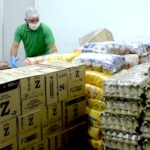
BBVA Colombia and Fundación Solidaridad por Colombia coordinated ‘Ayudar nos hace bien’, a food distribution campaign led by the First Lady of the Nation.
In July 2020, during the peak of the pandemic in Colombia, BBVA also donated 10,000 bio-safety kits, consisting of goggles, protective masks, N95 masks, robes and globes. The kits were distributed among 50 hospitals in the country.
Daniel Rocha, head of the company supplying the kits, emphasizes that “BBVA settled for nothing less than the high-quality supplies, and, due to the situation across the globe at that time, with a high demand for this kind of products, we really had to work hard to find them. But we did it and were able to fulfill our commitment and distribute the supplies across the country.”
Digital skills for senior citizens
Back in Spain, collaboration became the name of the game. “Companies stepped up to the challenge, understanding that either we all started helping each other and working together, or we were going down,” says Fernando Pérez-Ordoyo, head of International Partnerships and the Spanish Red Cross Network, an entity with which BBVA collaborated in a number of initiatives to help the elderly.
According to the Spanish Red Cross, beyond economic or in-kind contributions, the way “everyone adapted to the new situation and new forms of work" is also worth praising. The humanitarian organization launched Cruz Roja RESPONDE, the largest resource mobilization plan it has ever undertaken.
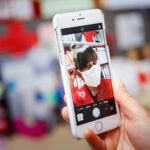
Imagen: Cruz Roja Española
Faced with the emergency scenario brought about by the coronavirus health crisis, BBVA worked with the Spanish branch of the humanitarian organization to jointly tackle one of the most harrowing side-effects of the pandemic for senior citizens, one of the hardest hit demographics by the pandemic: loneliness and isolation.
To combat this isolation, both organizations joined forces and organized workshops and individual sessions to help participants learn new tech-related skills. Also, the BBVA volunteer team devised a solution to check on and accompany the elderly.
According to data published by the European Statistical Office, about half of the people aged 65 to 74 years of age who use the internet have low digital literacy levels. BBVA's contribution to the aforementioned Spanish Red Cross campaign allowed it to support 1,164 senior individuals with 9,230 basic needs and train 3,000 seniors in digital skills. The bank donated a total of 600 tablets in compliance with the Spanish Red Cross’ quality plan.
With the same purpose of keeping the elderly company, BBVA also donated a total of €177,000 euros to the 'Ante el coronavirus. Cada gesto cuenta (Amid coronavirus crisis. Every gesture matters)' from Cáritas Spain to help almost 600 elderly citizens in a situation of social vulnerability and functional dependence. Part of this amount was also used to implement measures aimed at alleviating the loneliness and despair that many elderly people have experienced while isolating at home.
Science against future pandemics
BBVA’s 'Social Response to COVID-19' aid plan also provided support to the scientific researchers striving to find solutions to the pandemic from different fields of science.
Luis Álvarez Vallina, head of the Cancer Immunotherapy Unit of the 12 de Octubre Research Foundation, recognizes that aid from the private sector was essential in promoting cutting-edge research in this pandemic. “Companies such as the BBVA Foundation play a key role, it allowed us to launch some extremely necessary projects to tackle the major social and health challenge that we are currently facing as a result of the coronavirus. And I think it also sets an example that will probably drive other companies to collaborate in this collective effort. I think it is essential, if Spain wants to be home to cutting-edge innovation and development projects, it needs to have agencies and foundations that collaborate. In this sense, this foundation is a pioneer and an example for others to follow,” he explains.
If Spain wants to be home to cutting-edge innovation and development projects, it needs to have agencies and foundations that collaborate.
The team led by the researcher – which received one of the 20 grants awarded by BBVA Foundation – is conducting pioneering research into synthetic immunotherapy, a technology that would allow anticipating future epidemics and prevent them from becoming pandemics. “We use certain segments of the AC2 protein to generate a kind of synthetic molecules that can block the interaction of the pathogen,” explains the doctor, who illustrates how these molecules, in some way, work similarly to the molecules of the antibodies that are generated after infection or vaccination. “The difference is that antibodies are much more specific. But if variants arise, as is happening with the different strains of the virus, these antibodies may lose their neutralization capacity,” he concludes.
However, the synthetic molecules developed by Dr. Vallina's team could neutralize any COVID variant. Also, the project can be easily scaled up and the technique is not invasive: for example, for patients at risk or with pathologies, it would be administered using a nebulizer with RNA nanoparticles, to protect them against infection or help those infected to better neutralize the virus. Unlike the development of specific antibiotics or vaccines, this therapy would allow taking action as soon as the infection is detected.
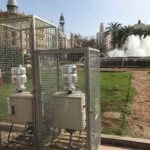
An aerosol detector installed in Castellón / Image: Juana Mari Delgado-Saborit.
Dr. Juana María Delgado Saborit’s team also received one of the BBVA Foundation’s grants. Dr. Delgado is a GenT Distinguished Researcher of the Perinatal Epidemiology, Environmental Health and Clinical Research Group of Universitat Jaume I.
In her case, the €100,000 euro grant was used to find evidence on the role of aerosols loaded with viral particles as a vector of contagion of the SARS-CoV-2 virus.To measure virus particles in the atmosphere, the Universitat Jaume I team devised a system capable of filtering the air to collect samples of these aerosols over 24 hours.
“The implementation of networks capable of warning about the presence of pathogens in the air is extremely useful for the Administration,” explains Delgado, because "a tool of these characteristics would provide evidence about the existence of microbiological risks and facilitate decision-making and strategy design processes as well as the proposal of emergency plans and action measures.”
In the case of this research team in Environmental Health, "the funding provided was instrumental able in launching a cross-cutting and multicenter research project aimed at developing a tool capable of warning about SARS-CoV-2 transmission risks.” Delgado also emphasizes that, the current research investment programs promoted by the private sector make it possible to “execute of collaborative and cross-disciplinary science in emerging areas, and enables the development of a research career, while boosting the dynamism of the national research system ”.
Twenty research teams are currently studying different aspects of the COVID-19 pandemic thanks to the special call for grant applications launched by the BBVA Foundation, which was endowed with 2.7 million euros. After assessing the almost 1,000 projects submitted, five expert commissions agreed to award four grants in Biomedicine (€250,000 per project); four in Big Data and Artificial Intelligence (€150,000 euros per project); four in Ecology and Veterinary Medicine (€100,000 per project); four in Economics and Social Sciences (€100,000 per project); and four in Humanities (€75,000 per project).
The socio-sanitary crisis is still unfolding and weighing down on the economy, placing a particularly high toll on the most vulnerable layers of society. One year later, BBVA is still focusing on helping its clients and society at large to promote inclusive growth.